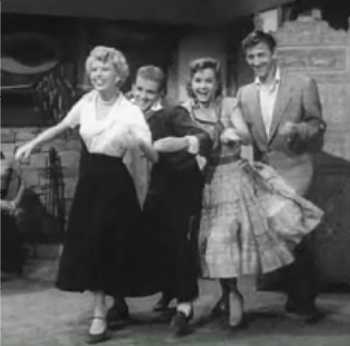Written by: Winifred Hervey
Directed by: Terry Hughes
Airdate: December 7, 1985
The Custody Battle presents us with a very curious situation. It is the second Golden Girls episode where sisters are fighting. Just like the last battle between siblings we saw, The Custody Battle actually shows that love can spring from hidden animosity.
Sophia Petrillo (Estelle Getty) thinks she is doing well by trying to get her daughter Dorothy Zbornak (Bea Arthur) to go out. Dorothy angrily pushes Sophia's efforts away, demanding to be given space. Their battle is temporarily suspended when Sophia's other daughter Gloria (Doris Belak) comes to visit. Gloria is a wealthy widow in California, with servants and Bert Convy shopping at the same grocery store. Sophia accepts Gloria's offer to move in with her.
Dorothy is upset at the news, as so are her housemates Blanche Deveraux (Rue McClanahan) and Rose Nylund (Betty White). Blanche and Rose are auditioning for a local production of Macbeth, with Blanche convinced she will be cast as Lady Macbeth. It helps that she slept with the director. Blanche's efforts to sleep her way to the top flop, as she ends up cast as Witch #3 and Rose ends up as Lady Macbeth. After a fight between Dorothy and Gloria, they reveal that each thinks the other is Sophia's favorite only to find that maybe Sophia loves them both the same.
Judging from The Custody Battle, I think Gloria is the youngest of Sophia's three children. Dorothy makes a comment that it is natural for Sophia to be fond of Gloria as she is "the baby". This, I think, will fluctuate, for I think in other episodes it is Sophia's son Phil who is referred to as the baby of the family. I think Dorothy is the oldest of the Petrillo children. We also see what becomes a regular occurrence on The Golden Girls: Rose and Blanche participating in local theater productions. Dorothy does try out for community theater every so often, but it is more often Rose and Blanche who are seen auditioning. It looks like this is a shared interest for them.
We learn that Gloria has at least one daughter, Katherine, and that Rose has nine siblings. In The Competition, we learn that Rose has six brothers. We know that one of them lives in Houston per Blanche and the Younger Man. As such, Rose would be one of three girls born to Alma Lindstrom and her husband.
Only one section is cut from rebroadcasts of The Custody Battle. It is a scene where Dorothy talks about her feelings of inadequacy over Gloria.
Somehow, it seems that all four Golden Girls have sister issues. While they mostly get along with each other, Dorothy, Sophia, Blanche and Rose all have fraught relationships with their female siblings. I do not know why that is. We saw this with Blanche and Virginia in Transplant. Later on, both Sophia and Rose will have episodes where they are fighting with their own sisters. The Custody Battle focuses on the rivalry between Dorothy and Gloria.
What elevates The Custody Battle is that it rings true. The conflicts within House Petrillo are relatable and none are out of maliciousness. In fact, both of them come from a sense of love. Sophia means well even if she does not know when to pull back. Dorothy and Gloria too mean well, at least when it comes to Sophia. Each of them genuinely loves their mother, even though Sophia has pitted them against the other. We see this in the final fight between Gloria and Dorothy. All this time, the audience is led to think that Gloria is Sophia's favorite (The Heart Attack notwithstanding). Gloria has led a pretty charmed life: a wealthy husband, successful children (save for Katherine who like her mother and grandfather got large noses), shopping with Bert Convy.
However, Gloria reveals another side to Mother Petrillo as well as her own issues with Dorothy. Gloria had her own sense of inferiority towards her older sister. Dorothy is strong and capable of handling herself, with lots of friends and a career. As Gloria tells her, in Sophia's eyes, she could never measure up to Dorothy, something she pointed out in English and Italian. Sophia, despite being sharp-tongued and at times belittling towards Dorothy, relies on her eldest daughter for protection and security.
We see this in a wonderful moment between Arthur and Getty when Dorothy comes into Sophia's room as she is packing. As played by them, it is clear neither wants Sophia to leave, but both are too proud to admit it. It is such a well-acted scene: quiet and effective.
It also is charming to think, as Sophia tells them, that while most children fight over getting rid of their parents, her children are fighting to see who gets to keep her. Underneath the sibling rivalries and parent-child conflicts, there is a lot of love.
Blanche and Rose have a lesser plot of who will be Queen of the Scottish Play, but it gives them funny bits to play with. The idea of sweet Rose portraying the wicked Lady Macbeth must reveal an actress of intensity and skill. Who would think Rose Nylund would make such an excellent manipulator and murderess?
The Custody Battle is sweet and funny, working well in balancing humor and heart.
If Sophia had ended up moving to California to live with Gloria, do you think Coco would have gone with them to for a chance to grocery shop with Bert Convy?
9/10
Next Episode: A Little Romance














